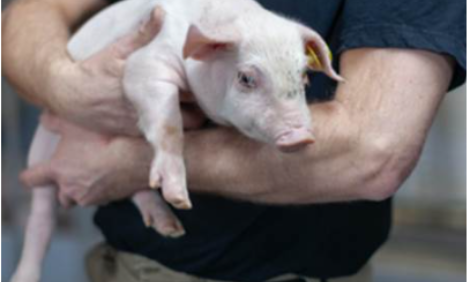



Effect of Dietary Addition of Denagard (Tiamulin) and CTC (Chlortetracycline) on Pig Performance Immediately after Placement in the Finishing Barn
Adding Denagard and/or CTC to diets immediately after pig placement in the finisher house can improve growth performance, according to new research from Kansas State University but the benefits were not maintained in the subsequent period when pigs were fed non-medicated diets.At the 2012 Kansas State University Swine Industry Day, S. Nitikanchana and colleagues presented a study, in which a total of 1,313 pigs (PIC 1050 × 337; initially 49lb) were used in a 35-day study to determine the effects of adding Denagard (Tiamulin) and CTC (chlortetracycline) to feed on pig performance immediately after placement in the finisher barn.
Pigs were transported from one nursery facility and placed into the finishing barn without maintaining pen integrity. Immediately after placement in the finishing barn, pens of pigs were weighed and randomly allotted to treatments arranged in a 2 × 2 factorial with main effects of Denagard (0 and 35g per ton; Novartis Animal Health, Greensboro, NC) and chlortetracycline (CTC; 0 and 400g per ton).
Diets were corn-soybean meal–based and contained 20 per cent bakery and 35 per cent dried distiller's grains with solubles (DDGS).
Treatment diets were fed from days 0 to 15 with a common non-medicated diet fed from days 15 to 35.
An interaction (P<0.01) was observed for average daily feed intake from days 0 to 15 and for the overall period, with pigs fed the diet without medication and the combination of Denagard and CTC having greater average daily feed intake than either medication alone.
Adding antibiotics to the diets also improved feed:gain ratio from days 0 to 15, with no differences among pigs fed Denagard, CTC or their combination (Denagard × CTC interaction, P<0.01).
Adding Denagard or CTC to diets improved (P<0.01) average daily gain and feed:gain ratio from days 0 to 15; however, when the antimicrobials were removed from the diet (days 15 to 35), average daily gain of pigs previously fed any of the medicated diets decreased (Denagard P<0.01; CTC P<0.06) compared with pigs previously fed the non-medicated diet.
Because the advantages in growth performance from days 0 to 15 were lost during the period from days 15 to 35, there were no differences (P>0.15) in overall average daily gain or feed:gain ratio.
In conclusion, reported Nitikanchana and colleagues, adding Denagard and/or CTC to diets immediately after pig placement in the finisher can improve growth performance but the performance was not maintained in the subsequent period when pigs were fed non-medicated diets.
Reference
Nitikanchana S., S.S. Dritz, M.D. Tokach, J.M. DeRouchey, R.D. Goodband and J.L. Nelssen. 2012. Effect of dietary addition of Denagard (tiamulin) and CTC (chlortetracycline) on pig performance immediately after placement in the finishing barn. Proceedings of the Kansas State University Swine Industry Day 2012, p343-347.
You can view the full paper in the proceedings by clicking here.
Other papers presented at this conference can be viewed by clicking here.
February 2013








